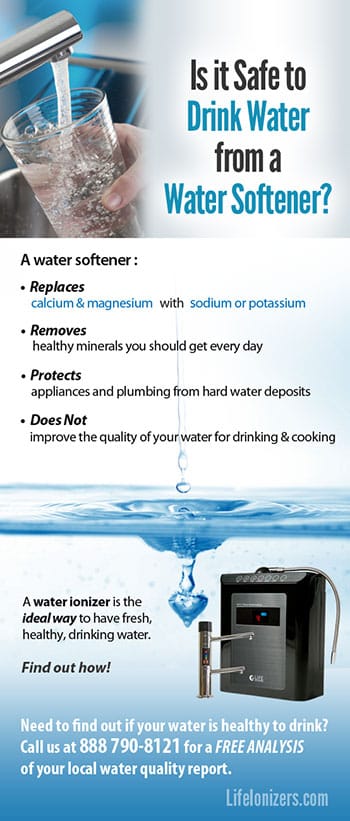A water softener replaces the calcium and magnesium in tap water with sodium or potassium, depending on what kind of salt is used in the water softener system. Generally, the amount of sodium put into water by a water softener is small, only about 12.5 milligrams per 8 ounce glass of water, so it’s ok for normally healthy people. However, if you are on a low-salt diet it’s best not to drink softened water.

A healthier option is to bypass the water softener because it removes some of the healthy minerals you should get every day from water. The World Health Organization recommends you get 10 – 20% of your daily needs for calcium and magnesium from drinking water. A water softener replaces some of those essential minerals with sodium. If you have hard water, your water contains plenty of calcium and magnesium. A water ionizer, or other home drinking water system is a better choice for making your tap water healthy to drink.
Reverse Osmosis – What to do if your water quality is really bad
If you live close to a hydraulic fracturing “fracking” operation, coal mining or processing, or other source of chemical pollution, your water may need to be filtered by reverse osmosis. This is frequently the case if your water smells like rotten eggs, oil, or has any other strong odor.
A reverse osmosis system removes over 99% of contaminants in your water, leaving you with nearly pure water. To make that water better for your health, you would then need to remineralize it by running a remineralization cartridge. Reverse osmosis takes out over 99% of the minerals in water. Keep in mind, you need to get minerals from water for good health, so the remineralization cartridge puts the healthy minerals you want back into your water.
How a water softener works
Hard water is a real problem for many homeowners, it creates deposits that can clog plumbing and appliances. Those deposits are caused by calcium and magnesium present in tap water. A water softener uses a chemical process called ion-exchange to reduce the amount of calcium and magnesium in tap water. Water softeners use negatively-charged beads made of a special resin to attract and trap calcium and magnesium ions. The beads lose their effectiveness over time, and must be recharged using sodium or potassium salt. The recharging process results in some salt being left over in the charged resin beads. That residual salt ends up in drinking water. It’s important to note that a water softener doesn’t add salt to water as part of the softening process.
What softened water should be used for
If you have a water softener, the water it makes is for washing, bathing, and cleaning. Water softeners are used to protect appliances and plumbing from hard water deposits. The only things you don’t want to use softened water for are drinking and cooking. For this reason, you should bypass the water softener system at the kitchen sink, because that’s where you get your water for drinking and cooking from.
Should you bypass a water softener system to get drinking water?
Yes, in fact homes built in the 1980’s or newer must have a fresh water bypass built in so you can get water straight from the tap. In addition, most home water softener systems come with a bypass specifically for that purpose. Water softeners don’t remove toxins from tap water, so you still need to filter the water before drinking it.
How to use a water ionizer with a water softener
If your home has a water softener system, and you want to add a water ionizer, you should bypass the water softener and connect your source water directly to the water ionizer. The advantage of having a water ionizer is that it makes hard water hydrate better, and makes the minerals in water more bioavailable. In short, you want the minerals present in your tap water to be there so they can contribute to the health benefit of the alkaline water made by the water ionizer. If you own a Life Ionizer, the prefilter system and internal filters in your ionizer are designed to make your tap water healthy. No water softener system is needed.
Why a Water ionizer is a smart investment
A water softener system makes your tap water safe for your plumbing and appliances, but does nothing to improve the quality of your water for drinking and cooking. A water ionizer is the ideal way to have fresh, healthy, drinking water in your home for much less than the cost of bottled water. Ionized alkaline water from a water ionizer tastes slightly sweeter and a lot more refreshing than plain or bottled water. It also makes the food you prepare with it taste better.
Ionized alkaline water is better for you as well, it hydrates better than plain water, and provides about 10 – 20% of your daily needs for calcium and magnesium. Your body absorbs calcium and magnesium 30% faster and easier from water than it does from food. One of the largest studies ever conducted on water and heart health, called “Hard water and the heart, the story revisited” revealed that “The more alkaline the water, the greater the protective effect on the arteries”.
Need to find out if your water is healthy to drink? Call us at 877-959-7977 for a free analysis of your local water quality report